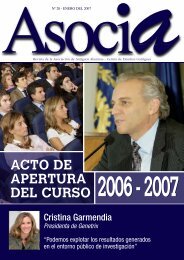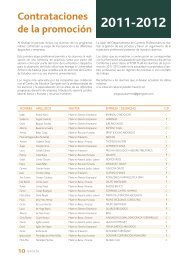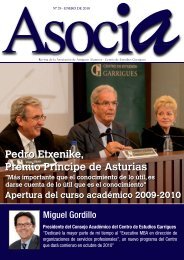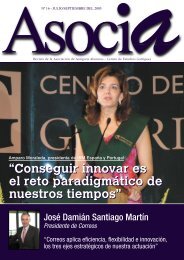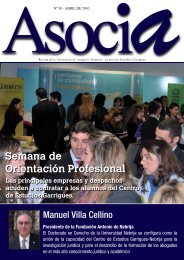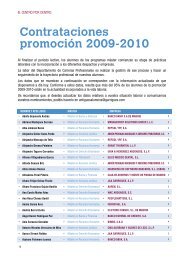Nº 23, Enero 2008 - Centro de Estudios Garrigues
Nº 23, Enero 2008 - Centro de Estudios Garrigues
Nº 23, Enero 2008 - Centro de Estudios Garrigues
You also want an ePaper? Increase the reach of your titles
YUMPU automatically turns print PDFs into web optimized ePapers that Google loves.
ENTREVISTAacadémico en una serie <strong>de</strong> áreas <strong>de</strong> Harvard,estudiando Derecho privado, públicoy modos <strong>de</strong> pensamiento sobre elDerecho estadouni<strong>de</strong>nse. En segundolugar, nos permite asomarnos a la vida <strong>de</strong>una dinámica y enérgica firma española yofrece a la facultad la posibilidad <strong>de</strong> relacionarsecon jóvenes abogados en uncontexto que <strong>de</strong> otra forma no estaría anuestro alcance. Por todo ello, creo quese trata <strong>de</strong> una experiencia muy interesante.¿Tiene noticia <strong>de</strong> iniciativas similaresen alguna firma legal estadouni<strong>de</strong>nse?Existen muchos programas <strong>de</strong> formacióncontinua <strong>de</strong> carácter legal puestos enmarcha por firmas estadouni<strong>de</strong>nses y, enalgunas ocasiones, cuentan con la participación<strong>de</strong> profesores <strong>de</strong> faculta<strong>de</strong>s <strong>de</strong>Derecho estadouni<strong>de</strong>nses. Sin embargo,por lo general, son mucho más breves:seminarios <strong>de</strong> un día o <strong>de</strong> un fin <strong>de</strong> semana<strong>de</strong> duración, en los que toman parteprofesores o cargos públicos. En mi opinión,lo que hace único al curso <strong>de</strong> <strong>Garrigues</strong>es que se trata <strong>de</strong> un programa continuoa largo plazo para los abogadosparticipantes, ofreciendo un tipo <strong>de</strong> formaciónque no he visto en otros casos.¿Por qué los jóvenes abogados <strong>de</strong>beríaninteresarse por el Derecho comparadoy cómo pue<strong>de</strong> impactar en sucarrera profesional?Hoy día es muy difícil ejercer sin teneralgunos conocimientos sobre el Derechoaplicable en otras jurisdicciones. EnEstados Unidos es algo que sabemos<strong>de</strong>s<strong>de</strong> hace mucho; el Derecho <strong>de</strong> Massachusettsno es el mismo que el <strong>de</strong>California. Por ello, en cierto modo,siempre hacemos Derecho comparado<strong>de</strong>ntro <strong>de</strong> nuestro propio or<strong>de</strong>namientoy está cobrando cada vez más importanciaen la práctica legal en Europa con laaparición <strong>de</strong>l mercado europeo. Notodo el Derecho proce<strong>de</strong> <strong>de</strong> Bruselas.Cualquiera con nociones <strong>de</strong> Derechoeuropeo sabe que se gesta en Bruselase internamente en cada país y que existeuna necesidad constante <strong>de</strong> enten<strong>de</strong>rla relación entre los or<strong>de</strong>namientos jurí-Do you know of any similar initiatives inAmerican law firms?There are many programs of continuinglegal education that American firms engagein and they sometimes bring facultyfrom American law schools to participate.But they are usually much shorter in duration,so it is a one-weekend or one-dayseminar, in which they would have a varietyof faculty or government officials participating.What I think is unique about the <strong>Garrigues</strong>course is that it is a sustained, longtermprogram for the lawyers who participate.That provi<strong>de</strong>s a kind of training that Ihaven’t seen in other cases.Why should young lawyers be interestedin comparative law and how couldthis impact their professional careers?It is very difficult to practice law nowadayswithout knowing something about the lawin other jurisdictions. We learned this inthe United States a long time ago; the lawin Massachusetts is not the same as thelaw in California. So, in a way, we alwaysdo comparative law within our ownsystem and that has become increasinglya part of legal practice in Europewith the emergence of the European market.All the law is not ma<strong>de</strong> in Brussels.Anyone who un<strong>de</strong>rstands European lawknows that it is ma<strong>de</strong> in Brussels and atthe national level and there is a constantneed to un<strong>de</strong>rstand the relationshipamong national legal or<strong>de</strong>rs within theEuropean system. The same now is trueat the global level. You have standardsand conventions for legal practice thatare part of the global financial networkand are rooted in the law as it is practicedin London or New York or Hong Kong. It isalso spread across a variety of differentjurisdictions. And then you have the interactionof all the various places whereclients are doing business. So, practicinglaw in an increasingly international economymeans comparative law.This is related to my next question: doyou think that having different lawsystems difficults the existence of globalizedtra<strong>de</strong>?One question that I think would be veryinteresting to learn more about is the extent12





